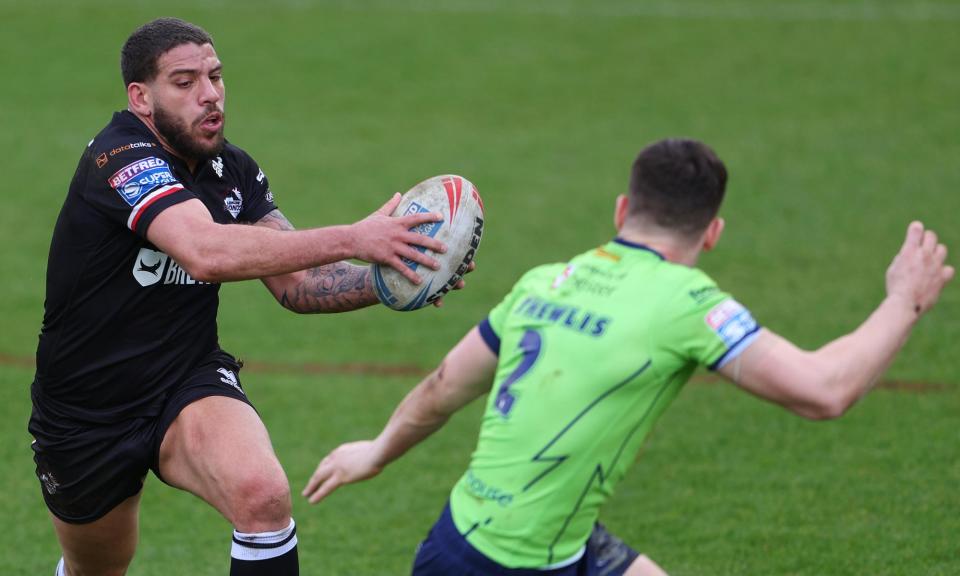Breaking fasts and making tackles: how rugby league is adapting to Ramadan

London Broncos’ Challenge Cup defeat at Warrington Wolves last weekend was largely uneventful given the final scoreline, but there was a moment of huge significance almost everyone would have missed midway through the Broncos’ 42-0 defeat.
Support staff providing players with water is nothing new, but the sight of London’s physio entering the field with a handful of dates specifically for the Broncos’ Hakim Miloudi to break his fast while the game continued perhaps emphasised the work rugby league still has to do to recognise Muslim athletes. “There was no time to stop and break my fast properly, I was making tackles within seconds of eating,” Miloudi smiles.
Related: Makinson and Hurrell score late tries as St Helens end Wigan’s winning run
Rugby league is played extensively in northern towns and cities with significant south Asian and Muslim communities such as Bradford and Batley, yet the game has never been able to fully engage them. Miloudi is one of two London players alongside Iliess Macani who are proud Muslims and celebrate Ramadan, despite the challenges that come with fasting for more than 12 hours a day while trying to train and perform as full-time, professional athletes.
“The club’s support is brilliant,” says Macani. “There’s nothing set in stone with my training routine. They’re very happy to pull back and modify my training if I’m feeling weaker than usual because of the fasting. But they trust me to tell them that if things are becoming too difficult, which sometimes they can be, I can sit sessions out. We’ve done lots of experiments to see what works best for me and we’ve found a good common ground. I trust the club.”
Macani and Miloudi are among a handful of Super League players who observe Ramadan, a group which includes the Salford centre Nene Macdonald and Catalans winger Fouad Yaha, who became the first Muslim to appear in a Grand Final in 2021. London were pioneers in signing the Muslim athlete charter with Nujum Sports, which is aimed at attracting more Muslim players to the sport.
“I’ve been observing Ramadan since I was young, doing the full month. It’s been hard sometimes,” Miloudi says. “But I want to teach my son about the importance of Ramadan and how it’s not just about fasting, it’s about the spiritual side. It’s really crazy here how many people observe Ramadan because in France, it’s not the same. But here, all the clubs look after the players and make them feel happy and not out of place.”
Macani agrees: “There’s a lot more awareness now. The RFL have worked hard and they’re keen to get opinions and support players.”
Bradford Bulls recently hosted an iftar – the fast-breaking evening meal – while the call to prayer was played over the loudspeaker at their stadium. But Macani, as a former Bradford player, still believes there is more work to be done. “This has always been a problem for the game,” he says.
“Even when I was at Bradford, I just didn’t see much going on in schools, for example. But the more young players see and identify with players like us, if they can see there’s a Muslim player in Super League observing Ramadan, it shows there are no barriers. That’s one thing we need to push more, stories like ours, to show kids in those communities that rugby league could be an option for them.”
The pair also hope rugby league can consider an in-game break, like in football, to allow players to break their fast properly and avoid a repeat of the chaotic scenes that saw Miloudi doing so while the game was continuing last week. “The next step is a break to allow players to break their fast properly and not in the middle of games,” he says.
Still, Macani and Miloudi hope to leave a legacy far greater than their on-field performances. By speaking about their faith, they hope to inspire youngsters from communities where there is a significant south Asian presence to take up the sport. “I’m a proud Muslim and to have someone identify with me and see that a professional player is doing what I do, hopefully that means something,” Macani says.
“I’d love it if it paves the way for youngsters today to be encouraged to try rugby league. Like Hakim says, the next step is bringing in a break for the players to fast in the future like they have in football, that would be a great moment. But I just hope players like us can lay the foundations for future generations and in the years to come, the number of young Muslim players goes up. It’d be nice if we’d played a small part in helping that happen.”

